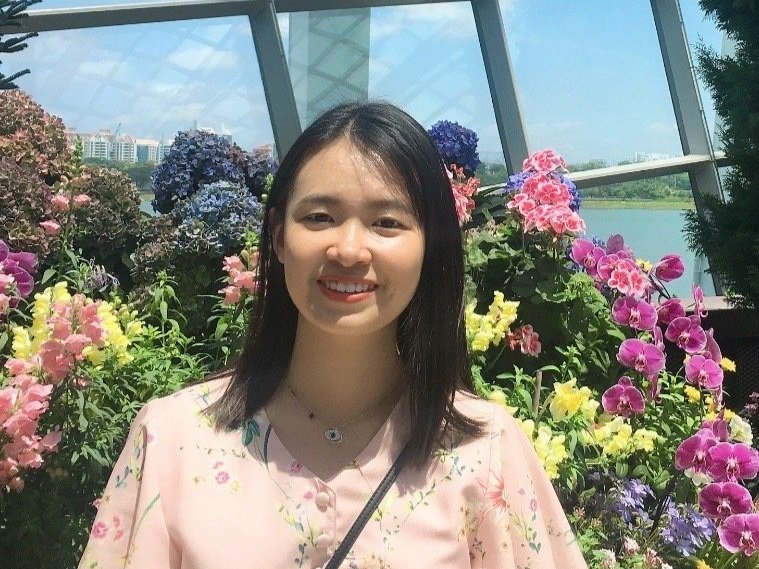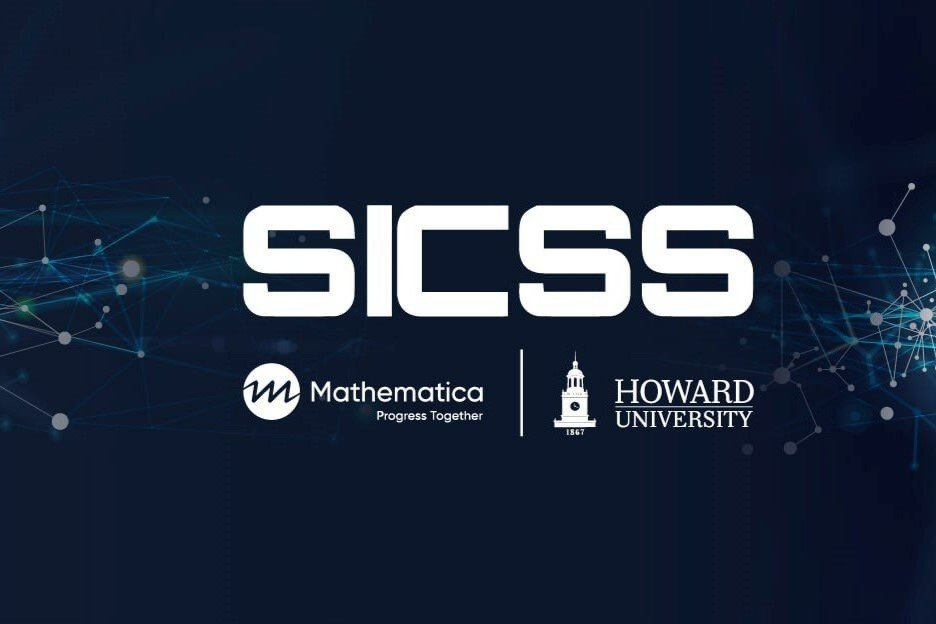Exploring Innovations in Computational Social Science: Highlights from SICSS-H/M's Bite-Sized Lunchtime Talks 2023
Howard University
This blog is part of a 3-year ongoing series “The Future of Computational Social Science is Black” about SICSS-Howard/ Mathematica, the first Summer Institute in Computational Social Science held at a Historically Black College or University. To learn more about SICSS-H/M’s inaugural start, read the 2021 blog “Welcome SICSS-Howard/ Mathematica 2021” or our first blog “Uncovering new keys to countering anti-Black racism and inequity using computational social science.” If you are interested in applying to participate in SICSS-H/M 2024, check out our website.
Bite-Sized Lunchtime Talks (BSLT) are a SICSS-Howard/Mathematica site-specific innovation that introduces participants to organizations doing cool things with data. 2023 offered a variety of organizations that proved interesting and inspiring to our participants.
Tuesday July 18, 2023 Polarization Lab
The BSLT series for 2023 was kicked off by Chris Bail, Ph.D., Co-Founder of SICSS, and Professor of Sociology, Political Science, and Public Policy at Duke University. Dr. Bail founded Duke’s Polarization Lab which brings together scholars in the social sciences, statistics, and computer science to study ways to bridge America’s partisan divide. During his pre-recorded session, Bail explained that their mandate is to conduct high-quality research on the drivers of incivility and extremism on social media, and to develop new technological solutions to address these factors by working with social media companies, non-profit groups and some governments.
Bail used a case study to show how the Polarization Lab has turned research results into practical solutions for people and social media companies. In the study, they examined what happens when people are removed from echo chambers, and discovered that exposure to opposing views can increase political polarization. Bail then explained their development of tools “designed to nudge people to learn to avoid trolls or see the gap between social media and reality,” such as the Bipartisanship Leaderboard, which describes the high-profile people whose tweets appeal to members of both parties.
Wednesday July 19, 2023 Deloitte Center for Health Services & Deloitte Health Equity Institute
Jay Bhatt, D.O., MPH, MPA, the Managing Director of the Deloitte Center for Health Solutions and the Deloitte Health Equity Institute, was our next BSLT speaker. The Deloitte Health Equity Institute focuses on creating cross-sector collaborations and tools to address disparities in the drivers of health, racism and bias, and structural flaws in the health system. In the pre-recorded session, Bhatt emphasized that health equity extends beyond equal access to care and requires an orientation around diversity and inclusion. He contended that “health equity is a moral imperative that requires business solutions," and displayed data on the cost of health inequity to demonstrate this.
During the live Q&A, Bhatt shared his experiences as a doctor and recounted how he used Bhangra dancing to uplift a patient's spirits, which evolved into a cherished hobby. He remarked, "it's an example of being vulnerable, being authentic, and showing up as who you are."
Thursday July 20, 2023 Data Nutrition Project
Sarah Newman, the Research Lead and Kasia Chmielinski, the Project Lead at The Data Nutrition Project, joined us on Thursday. Taking inspiration from nutrition labels on food, The Data Nutrition Project aims to build labels highlighting the key ingredients in a dataset. In the pre-recorded session, Newman explained that current AI systems are built on incomplete or biased data, and can perpetuate the biases present in those data; she emphasized the need for more dataset quality standards and tools to integrate quality interrogation in the data workflow. Chmielinski then introduced their current product, the Dataset Nutrition Label, which contains descriptions, use-cases, and risks related to a dataset, enabling users to better understand and use the data. They also introduced the benefits of dataset label-making as its own methodology, stating that "building the label and going through these questions is a great way for people to start to interrogate their own understanding of data."
During the live Q&A, Newman and Chmielinski shared how they updated their products based on user feedback, specifically the language used in label creation surveys. Chmielinski noted, "It's not so much the UX (user experience design) of the product... it's more about the framing, the narrative, the word choice."
Friday July 21, 2023 Federal Reserve Board of Governors
Erin Troland, Ph.D., Senior Economist at the Division of Consumer and Community Affairs of the Federal Reserve Board of Governors, joined us as the next Bite-Sized Lunchtime Talk speaker. During the pre-recorded session, Troland highlighted the impact the pandemic had on people behind on rent, with a particular inquiry into whether those behind on rent after the pandemic were the same group as before the pandemic. The percentage of renters behind on rent increased from 10% in 2019 to 17% in 2021. Troland and her team conducted research on the mechanism behind this change, hoping to better understand the efficacy of assistance programs during the pandemic.
According to Troland’s research, the pandemic did not change the types of renters who became behind on rent. “There are these pre-existing structural factors that are affecting renters with higher levels of housing insecurities and the pandemic exacerbated those factors," she commented. She stated that short-term pandemic assistance helped lower-income renters in the short term but cannot address longer-standing problems.
Monday July 24, 2023 Los Alamos National Laboratory
Sara Del Valle, Ph.D., scientist and project leader at the Los Alamos National Laboratory (LANL), joined us on Monday. Los Alamos National Laboratory is a government research institution focused on solving national security challenges through scientific excellence. In the pre-recorded session, Del Valle presented how her team enhanced decision support related to infectious disease by comprehending and predicting disease outbreaks through heterogeneous data streams, mathematical and computational models, and quantification of model uncertainty. She also introduced her current research in real-time disease forecasting, comparing its benefits to the forecasting of natural disasters - "if we were able to accurately forecast infectious diseases, we could reduce their impact, just like how we're able to forecast when hurricanes are going to make landfall and we can evacuate people." She opted to leverage internet, mobile, and satellite data, enabling analysts to access up-to-date information hourly and develop more accurate forecasts.
Wednesday July 26, 2023 varyCSS
The founders of VaryCSS, Tina Law, Ph.D. and Taylor Brown, Ph.D. joined us as the next speakers. Law and Brown started varyCSS with the hope of advancing and improving the realm of computational social science (CSS) by centering the work of scholars from historically underrepresented communities. They demonstrated the functionality of their website varyCSS.org, which is divided into two main sections. The first section is groups and workshops to support newcomers to CSS, and the second section is a database of speakers who are emerging CSS scholars from underrepresented groups. They also noted that they are developing a model CSS syllabus that is anti-racist, feminist and decolonial because "it's important to stay critical about who is being referenced or used as a reference category in discussions, and what context and populations are drawn on for examples and exercises."
During the live Q&A section, Law and Brown were joined by two other varyCSS members, Aidan Combs, Ph.D. and Katherine Zaslavsky, Ph.D, who delved deeper into challenges they face when translating the values they bring to academia with regard to the diverse work they are doing in varyCSS.
Thursday July 27 2023 D-Lab
D-Lab at the University of California, Berkeley, presented the next BSLT. They focus on intelligent research design for data-intensive social sciences, aiming to assist the Berkeley community with a full range of research development, research design, and data acquisition. Claudia von Vacano, Ph.D., the founding executive director of D-Lab, described how they support researchers across all disciplines and at all learning levels. Daniel Lobo, a computational social science fellow, explained their project “Undergraduate Data Science at Scale,” which evaluates, refines and disseminates the Berkeley model of data science education and Renata Barreto, a research fellow, demonstrated the project “Queering AI: examining the NSFW Model behind the 2018 Tumblr purge.”
Pratik Sachdeva, Ph.D., a Senior Data Scientist at D-Lab, joined during the Q&A session and reinforced the importance of the lab’s maxim, “it’s okay not to know.” Dr. Claudio von Vacano also reflected on D-Lab's ten year journey. While there have been drastic changes in technology and data science, she believes that D-Lab will remain "a human-centered institute and continue to be thoughtful about interpretation analysis and criticism," especially as AI brings new challenges to society.
For more information about SICSS-Howard/Mathematica, check out our website, follow us on Twitter, like us on Facebook, and join our email list. The application for SICSS-Howard/Mathematica 2024 is open! Apply now!
About the authors
Naniette H. Coleman is a PhD candidate in the Sociology Department at the University of California, Berkeley and the founder of SICSS-Howard/Mathematica. Her work sits at the intersection of the sociology of culture and organizations and focuses on cybersecurity, surveillance, and privacy in the US context. Specifically, Naniette’s research examines how organizations assess risk, make decisions, and respond to data breaches and organizational compliance with state, federal, and international privacy laws. Naniette holds a Master of Public Administration with a specialization in Democracy, Politics, and Institutions from the Harvard Kennedy School of Government, and both an M.A. in Economics and a B.A. in Communication from the University at Buffalo, SUNY. A non-traditional student, Naniette’s prior professional experience includes local, state, and federal service, as well as work for two international organizations, and two universities. Naniette is also passionate about the arts.
Edith Liu received her Bachelor of Arts in Economics and Certificate in Computer Sciences from University of Wisconsin-Madison. Edith is currently a Master in Quantitative Economics student at UCLA. Edith, a former research assistant in the AAC&U award-winning, Berkeley based Interdisciplinary Research Group on Privacy/Coleman Research Lab, served as an Event Staff for SICSS-Howard/Mathematica 2023.


















